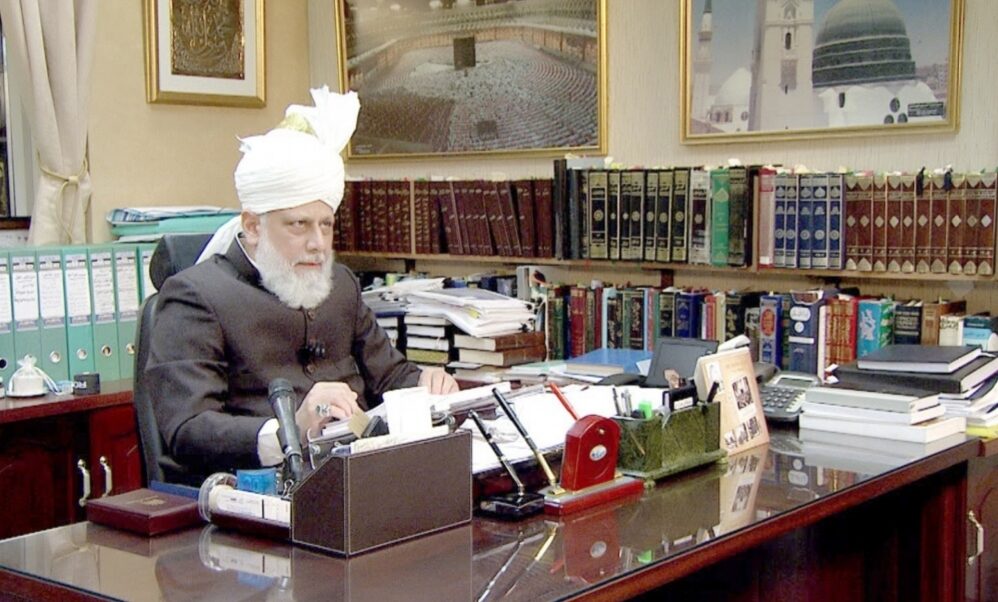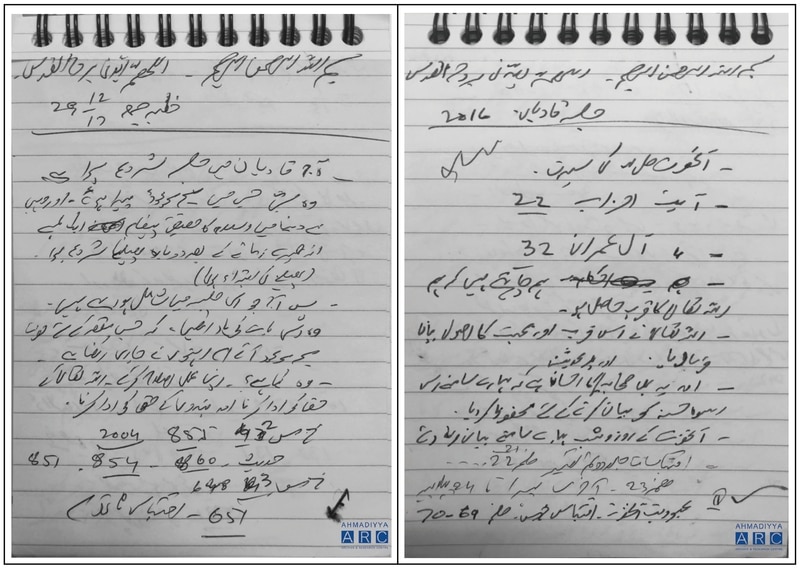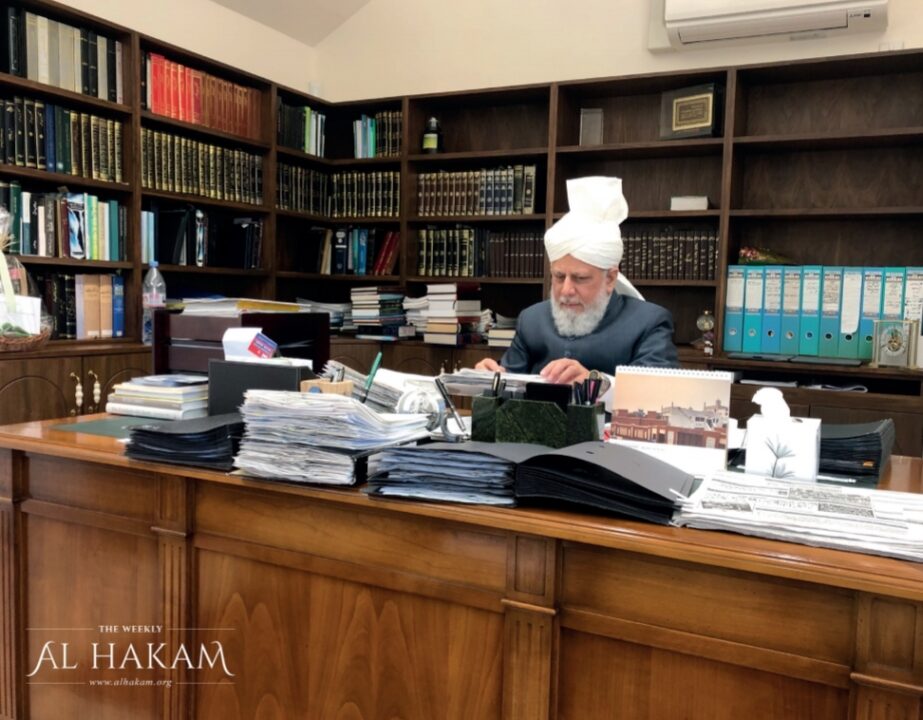Asif M Basit
When meeting Huzooraa, many extraordinary things are witnessed. Of them, the most striking is not only the calm and composure displayed by Huzooraa at all times, but the way it can bring peace to the person meeting Huzooraa.

For the last 15 years, I have witnessed that as soon as we enter Huzoor’s office for official audiences, Huzooraa will be seated at his desk occupied in work, with a large pile of letters in front of him. Very lovingly, he will say:
آؤ بھئی کیا کہتے ہو؟
“Come in! What do you wish to say?”
Just observe the tranquillity in this sentence; this one sentence is enough to transform the restlessness of a person into peace and calm. Every inch of Huzoor’s office is serene. Before proceeding to the topic of this chapter, let us observe Huzoor’s office upon entering this tranquil setting.
As described above, Huzooraa has before him a stack of letters, which he signs individually. At times, Huzooraa reads the text of a letter carefully and then signs it with his signature, while also, on occasion, issuing further instructions on the letter. As soon as that pile of letters is completed, another pile of letters is brought forward. Before Huzooraa are three thick folders, full of letters. When one folder is completed, he places it back, brings the next one closer and begins reading, signing and, where necessary, giving further guidance. The letters now bearing Huzoor’s signature are placed further away from him and the letters Huzooraa is yet to go through are also at some distance.
Initially, I thought that this process caused Huzooraa some discomfort and so, one day, as Huzooraa was about to place the signed letters back in their place, I extended my hand to offer help. But Huzooraa responded, “No, I will place them myself.”
Although I never had the audacity to repeat this again, but through my body language, Huzooraa probably gathered that every time he wanted to place the signed letters back or pick up a fresh pile of letters, I desired to help.
Thus, one day, Huzooraa instructed, “Take this and place it over there.”
As I was taking my seat, Huzooraa added, “Hand me more letters from there.”
Alhamdolillah, whenever I have had a mulaqat after that, I have been able to take advantage of this blessing. This all happens without any break in conversation and Huzoor’s work commences uninterrupted.
To aid him in writing, Huzooraa uses a glass platform, which is somewhat elevated from his desk. Some papers are placed beneath that also, but there is something in that pile that will be intriguing to all readers. Beneath that glass platform are papers, bound together by a bulldog clip, much like a thick notepad. It will either be empty or will contain Huzoor’s handwriting. The papers are placed at a landscape angle; however, I will return to these papers shortly. Alongside that pad are one or two pocket size jotting pads. Beneath that glass platform is also a piece of paper, which is probably a letter of an urgent nature.
I have at times observed Huzooraa take out that piece of paper after completing the letters, read it and after writing something on it, set it aside.
To one side of the office, on a bookshelf, Huzooraa has a complete set of Ruhani Khazain and other literature of the Promised Messiahas, for instance Durr-e-Sameen, Al-Qasaid-ul-Ahmadiyya etc. Before all those books is placed a copy of the Holy Quran, which itself is indicative of the extent of its use. Books on tafsir are also on the same shelf. These books are now spread along the entire bookshelf. Then there is Huzoor’s computer, homeopathic medicines, a bottle of drinking water and a glass.
At times, I have been fortunate enough to observe Huzoor’s bookshelves closely. Huzooraa will, for example, tell me to “look on the third bookshelf, on the third shelf ”, precisely describing the location of a book. In front of Huzooraa is a television, which has been used for showing Huzooraa MTA programmes for approval and guidance.
Whenever I have stepped forward to place the DVD of an MTA programme in the DVD player, very rarely have I found it to be empty. More often than not, a CD containing the audio of Hazrat Musleh-e-Maud’sra Sair-e-Ruhani speech is placed in it. After showing Huzooraa the MTA programme, Huzooraa will instruct me to replace the DVD with the CD that was in the player originally.
Huzooraa once played the audio of that CD to me. As Huzooraa proceeded with his work, the audio played. It was a very unique experience. The part of the speech that played was the one that is very famous, in which Hazrat Musleh-e-Maudra proclaims:
اے آسمانی بادشاہت کے موسیقارو! اے آسمانی بادشاہت کے موسیقارو!
“O musicians of the heavenly kingdom! O musicians of the heavenly kingdom!”
And another place, where Huzoorra says:
ہاں تم کو! ہاں تم کو! ہاں تم کو!
“You! Yes, you! Yes, you!”
The majestic voice of Hazrat Musleh-e-Maudra echoed in the office; the person sat before me was the chief of the extraordinary musicians of the heavenly kingdom.
As this blessed voice was being relayed, the blessed countenance of Huzooraa was in front of me. In this manner, the room was filled with awe, majesty and grandeur. I got to observe Huzoor’s blessed countenance in those moments for around 15 minutes. Huzoor’s spiritual splendour in those moments knew no bounds.
On Huzoor’s desk are many books and notes, as well as an electronic dictionary. What the drawers contain, I am not aware of, but every so often, stationery and other items are pulled out from those drawers to assist in Huzoor’s work.
Now, I would like to describe what goes on behind this serene and peaceful sight, something which we rarely get to see; in fact, none of us are able to see this because the routine that I am about to expound on consists of prayers in seclusion and dialogue between Huzooraa and God Almighty.
Nonetheless, however much I have witnessed and the amount I have understood, I shall describe. All of us are aware now that Huzoor’s day starts well before the Fajr prayer. We have also heard that Huzooraa attends his office much earlier than the staff at the private secretariat.
One morning, I got to witness this and it was something that will forever remain a precious memory. I arrived at the Fazl Mosque for my official mulaqat, one morning, a little earlier than usual. The waiting room for mulaqats was outside the private secretary’s office. No one was in the office at the time as the proper office hours had not yet begun. As I had to prepare notes for my mulaqat, I therefore went earlier than normal.
On the door that led to the private secretariat was a window, and behind that window was obviously darkness as no one was yet in the office. As I sat there, shuffling my papers in order, all of a sudden, a light shone through the window. Then I heard some movement from inside. The door opened. It was none other than my beloved Imamaa.
“You’ve come early! Alright then, come in.”
I was not ready at all; neither for a mulaqat so early, nor for this pleasant surprise. I gathered my papers immediately in whatever way I could, shot up and followed Huzooraa into the private secretariat and then to Huzoor’s office. Whilst trying to control my breathlessness, I managed to somehow seek guidance on various matters.

On that day, I observed how early Huzooraa attends his office. But Huzoor’s office follows him everywhere he goes; whether he is in his library at home, or another room in his house, I have come to learn that Huzooraa carries on with his work very late into the night.
I was called to Huzoor’s office after the Zuhr prayer on the day of the Baitul Futuh fire, which means that Huzooraa had left his office, led the Zuhr prayer and then instructed for me to meet him. By the time I reached the Fazl Mosque, Huzooraa had left his office, but returned after 10 minutes.
I recall that once, due to being under the weather, Huzooraa could not attend prayers at the mosque.
On a Thursday, I arrived at the private secretariat rather anxiously to enquire about the plans for Jumuah, and if Huzooraa was to deliver the sermon, whether it would be from Baitul Futuh as usual or from the Fazl Mosque. As I entered the private secretariat, I found the lightbulb outside Huzoor’s office to be on. I cannot describe how relieved I felt to see that light on! Huzooraa was occupied with work in his office. Although he was working, it still concerned me that he was unwell and all the while working.
I have seen Huzoor’s light on even after Isha prayer. This is all during our working hours. Otherwise, whether Huzooraa is in his office or at home, his workload always follows him. Many a time, Huzooraa has mentioned working at night or studying in the late hours to me. Thus, I am aware that Huzoor’s routine never sees a break.
Pondering over this routine, I always wanted to ask Huzooraa how he found time to prepare all the Friday Sermons – which span about an hour – his addresses to parliaments, at peace symposia and ijtemas; however, I never found the courage and so, I kept this question to myself for many years.
One day, however, I found the opportune moment and asked, “Huzoor, what is your daily routine?” With a sublime smile, Huzooraa answered, “Routine? What routine? Dawn breaks, then the Sun sets…”
I thought that was it, when Huzooraa continued, “I sleep a little, then I wake up; I work and that’s that.”
By adding a few more facts, I was able to put together a “jigsaw”, the result of which astonished me. The sum of this is as follows:
One day, I was fortunate enough to observe those small pocket size notepads that have been mentioned above. Huzooraa explained the contents of its pages whilst flicking through them. I noticed that every page was full of Huzoor’s handwriting. If someone was to copy the text of each page – which is no bigger than the palm of an adult size hand – it would cover an entire A4 page.

Huzooraa explained, “These are my notes for the concluding address at Jalsa Salana Germany 2015 … Waqf-e-Nau Ijtema … The 2008 address at the parliament … the address at Jamia Ahmadiyya’s convocation, but I didn’t take this with me. Whatever came to mind there and then, I said it.”
The notes of many addresses and sermons, all preserved in a tiny notepad!
“There are many more notepads like this upstairs. First, I would jot down points on pieces of paper, but now I make notes in these jotters.”
No one can say for certain how and when these notes are made and when those blessed moments are when a thought occurs to Huzooraa and he notes it down in his notepad.
One day, Huzooraa described the method of preparing Friday Sermons. Only Huzooraa can describe this because apart from him, only Allah knows. Huzooraa said, “On Thursday morning, I begin pondering over the subject matter for the Friday Sermon. If there are references and quotations selected beforehand, I prepare initial notes, until the Zuhr prayer.”
On this occasion, Huzooraa only described his preparations up until the afternoon prayer. Then, on another occasion, Huzooraa said, “On Thursday evening, I usually work a bit more on my Friday Sermon.”
This brought me to Thursday evening. Then, Huzooraa later added, “On my way to lead the Friday prayer, I continue making amendments to the Sermon.”

Now, it should be remembered that amidst all this, Huzoor’s usual routine continues; whether it is correspondence, official and personal audiences, inaugurating mosques, addresses at various events, classes with students and waqifeen, providing guidance to students, mulaqats with national amilas etc.
The jigsaw we now see before us still only consists of a mere few hours of Huzoor’s schedule. Thus, the revolutionary sermons Huzooraa delivers for the benefit of his Jamaat, nay the prosperity of the worldwide audience, take only a few hours to prepare.
I previously deemed them to take many days to prepare; however, I was yet to be amazed. Let us now share this astonishment together. I was still curious about Huzoor’saa preparations for Friday Sermons, especially as regards selecting quotations and finding appropriate references as I am aware from experience that this can consume entire days. But this was my biggest error, that I was attempting to fathom the time and planning of Khalifatul Masih by means of the time we take, efforts we make and planning that we pursue. We tend to forget that he belongs to a different dimension than us.
One day, perhaps Huzooraa was able to see the inquisitiveness in my eyes for he would clarify this curiosity of mine:
“I have to search for many references for Friday Sermons, but I have my own method for this.”
Huzooraa then picked up two books that were placed on his desk and opened up the index for one of them. The book was Mirza Ghulam Ahmadas Qadiani: Apni Tahriron Ki Ru Sey [The Essence of Islam]. Huzooraa handed me the book to look at the index. It appeared to me as a complicated mathematical formula. There were abbreviations, numbers and roman numerals marked here and there.
“What do you think it is?” I replied that I had not a clue.
Huzooraa then explained, “Look … The topic of prophethood in Islam [in Urdu].”
Huzooraa pointed towards a shelf and said, “Go and pick out the third volume of The Essence of Islam.”
After picking it out from the shelf, Huzooraa instructed, “Now, turn to page 125. What does it say?”
I read out what it said: “It says ‘Prophethood in Islam’.”
Huzooraa then instructed me to search for another page in another volume. Then one more.
Huzooraa then said, “I have made searching for references easy for myself in this way. I am able to find the required passage and time is not consumed in translation. Thus, I am able to save time. And if I require further clarification on a matter, I search the original reference of Ruhani Khazain and study the pages before and after the quotation.”
Whenever I have taken a cursory glance at Huzoor’s personal set of Ruhani Khazain, I have noticed flags and markings in various colours.
One day, I also had the chance to observe the personal notepad Huzooraa makes for himself with the aid of a clip and places it at a landscape angle. That day, Huzooraa had turned the pad the other way around, as one does when one side of the pad has been used and the other side is still empty. Huzooraa had written something on the page that was in front of me. That too was a blessed moment in which I mustered the courage to ask, “Huzoor, what have you written here and so extensively?”
Huzooraa explained that it was the text for the coming Friday Sermon. He was occupied in writing his Friday Sermon. Huzooraa added, “I prepare the sermon myself and write it myself too. I also write out the verses of the Quran. On my journey to the mosque [to lead the Friday prayer], I continue to make minor adjustments in the sermon.”
This was very surprising to learn. What astonished me most was how and when Huzooraa found time to write out his entire sermon. This was beyond my comprehension. The thought then occurred to me that as Allah has blessed Huzoor’s reading speed, so too must his writing speed also be blessed. I was not aware of Huzoor’s reading speed until one day, when I was left astounded in what was a completely different story.


Jazakallah. The insights are beautiful and faith inspiring. May Allah make us all into vessels for light of the Imam of the age.